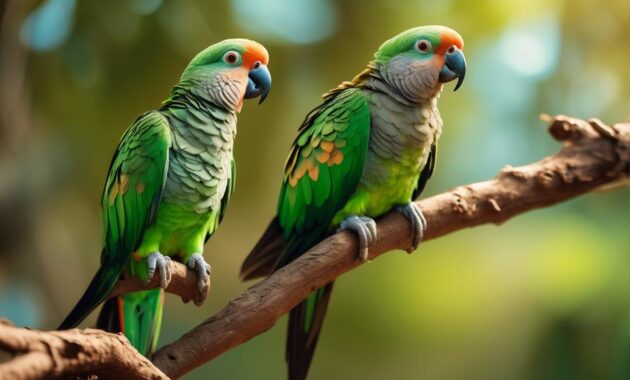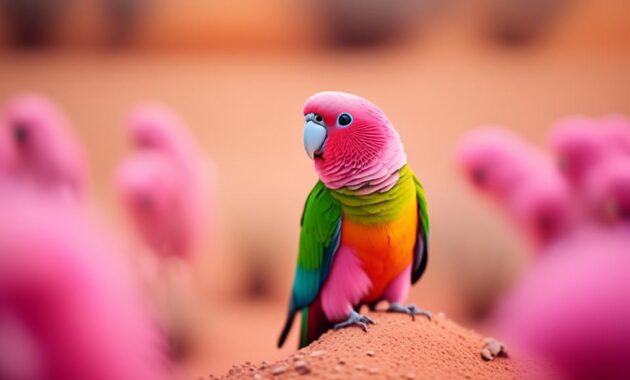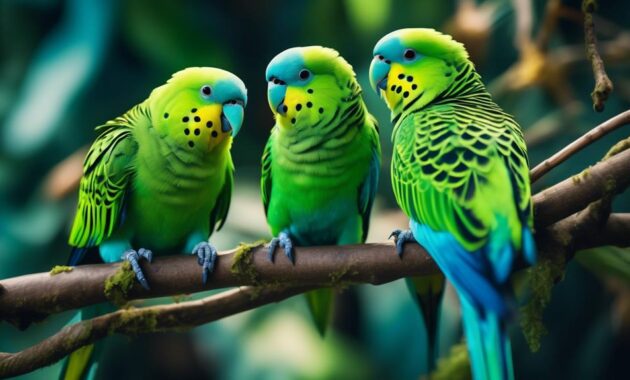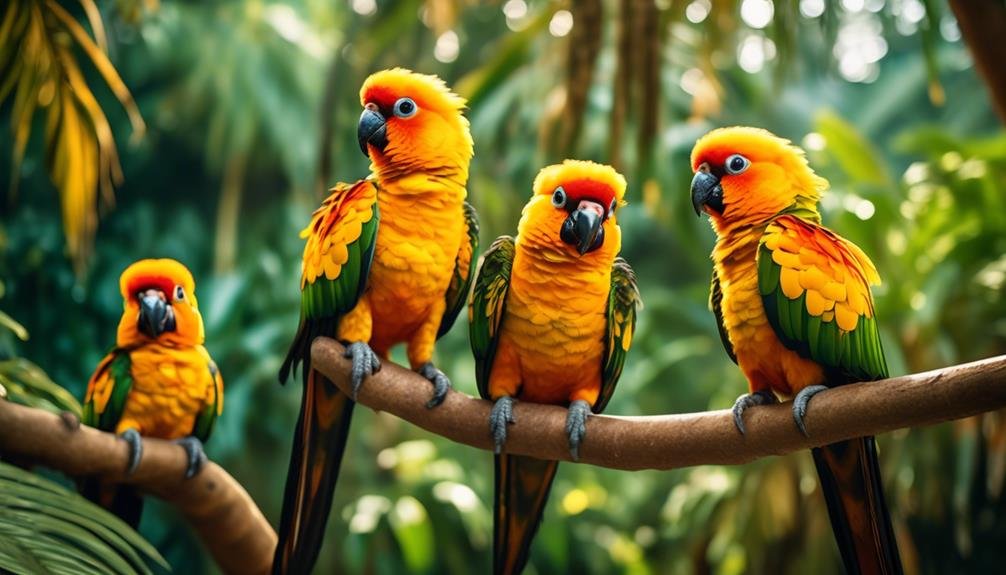
With their vibrant feathers that shimmer like a tropical sunset, Sun Conures are the playful parrots of Brazil. These colorful creatures captivate bird enthusiasts with their energetic and entertaining nature.
But there is more to these lively birds than meets the eye. From their sociable personalities to their ability to mimic sounds, Sun Conures have a unique charm that sets them apart.
So, let’s take a closer look at these delightful parrots and uncover the secrets behind their vibrant allure.
Key Takeaways
- Sun Conures are medium-sized parrots known for their vibrant and colorful plumage.
- They have a long lifespan of up to 30 years.
- Sun Conures are playful, social, and enjoy interaction with their human companions.
- Proper care, a balanced diet, regular vet check-ups, and mental stimulation are essential for their well-being.
Size and Lifespan
Sun Conures are medium-sized parrots that can reach a length of 12 inches and weigh up to 4 ounces. With their stocky build, they’re considered a popular choice among bird enthusiasts. These vibrant birds have a relatively long lifespan of up to 30 years. Proper care and nutrition are crucial in ensuring their longevity.
Sun Conures belong to the Conure species, known for their playful and social nature. They’re highly intelligent and can learn tricks and mimic sounds. Sporting a beautiful plumage, Sun Conures have a bright yellow body with reddish-orange details on the belly and face. Their back, rump, and lower wings are lush green, with hints of blue on their plumage.
Sun Conures are vocal birds, often mimicking sounds and enjoying singing and dancing along to music. Native to northeastern South America, particularly Brazil, they inhabit forests, woodlands, and savannas. In captivity, they require a spacious cage with plenty of toys and perches to fulfill their need for exercise and social interaction.
Bird Species and Personality
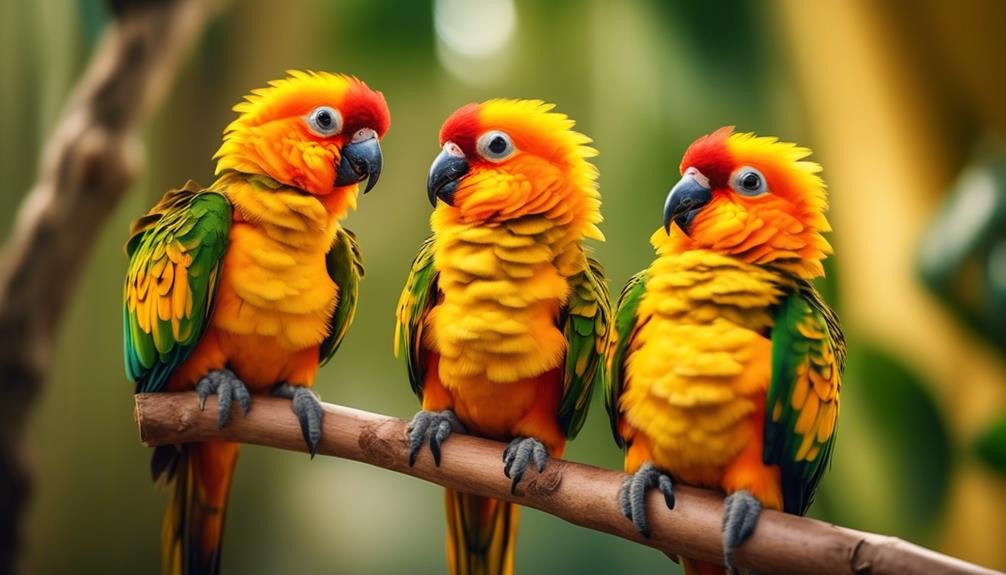
Belonging to the Conure species, these playful and social parrots are known for their intelligence and ability to learn tricks and mimic sounds. Sun Conures, along with other Conures, are highly intelligent birds that can be taught various tricks and can mimic sounds they hear. They’re popular as pets due to their entertaining behavior and vibrant colors.
Sun Conures have a vibrant and colorful plumage, with bright yellow bodies, reddish-orange details on the belly and face, lush green back, rump, and lower wings, and blue details on their plumage. They’re vocal birds and can learn and repeat familiar sounds, although their high-pitched screech call can sometimes be noisy.
In captivity, Sun Conures require a spacious cage with plenty of toys and perches, as well as regular exercise and social interaction to thrive.
Colors
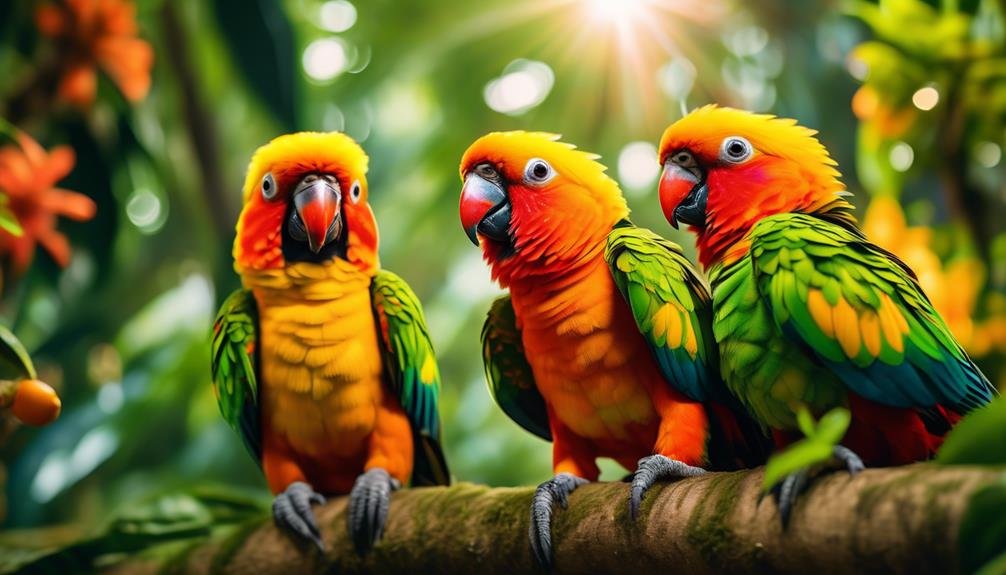
The vibrant plumage of Sun Conures showcases a stunning array of colors. These medium-sized parrots have a predominantly bright yellow body, with reddish-orange accents on their belly and face. Their back, rump, and lower wings are adorned in lush green feathers, adding to their vibrant appearance. Blue details can also be seen on their plumage, further enhancing their striking color palette.
The combination of these vibrant colors creates a visually appealing and eye-catching display. Sun Conures’ colorful plumage is one of the reasons they’re highly sought after as pets. Whether in their natural habitat in the forests and woodlands of northeastern South America or in captivity, their vibrant colors make them a delightful addition to any environment.
Sounds
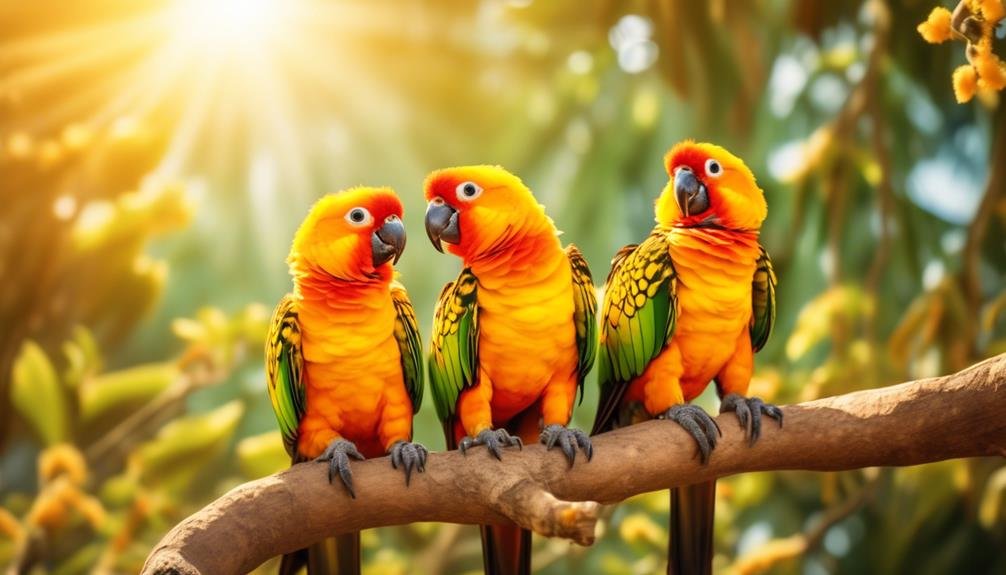
Sun Conures are known for their vocal nature and impressive mimicry skills. These playful parrots have a variety of sounds they can produce, making them quite entertaining pets.
Here are five interesting facts about the sounds of Sun Conures:
- They can learn and repeat familiar sounds, including words and phrases.
- Sun Conures have a high-pitched screech call that can be quite loud.
- They’re known to chatter a lot, especially when they’re excited or happy.
- Sun Conures enjoy singing and may even dance along to music.
- These birds are excellent mimics and can imitate other bird calls and even household noises like doorbells or phone rings.
With their wide repertoire of sounds, Sun Conures can bring a lively and vibrant atmosphere to any home.
Habitat

After exploring the vocal abilities of Sun Conures, it’s important to understand their natural habitat and the conditions they require to thrive.
Sun Conures are native to northeastern South America, particularly Brazil. In the wild, they inhabit forests, woodlands, and savannas.
In captivity, Sun Conures need a spacious cage with plenty of toys and perches to keep them entertained. They require regular exercise and social interaction to thrive. It’s essential to provide them with a balanced diet that includes a variety of fruits, vegetables, seeds, and pellets.
Sun Conures are adaptable birds, but they’re sensitive to temperature extremes. It’s important to maintain a comfortable and consistent temperature in their environment. Providing them with a warm, well-lit space will help them stay healthy and happy.
Diet and Feeding
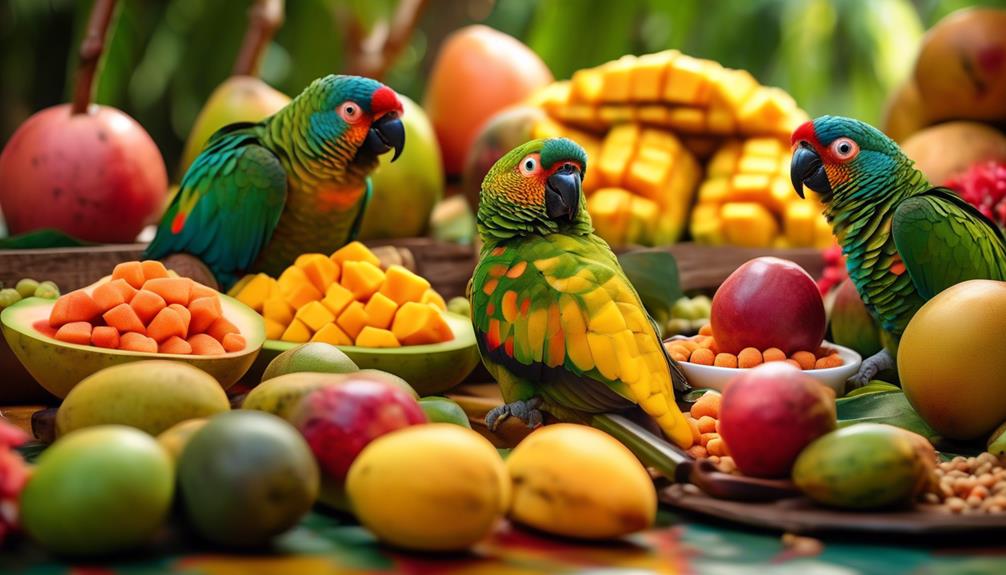
To ensure the health and well-being of Sun Conures, it’s crucial to provide them with a balanced and nutritious diet. These playful parrots have specific dietary requirements that should be met to keep them happy and healthy. Here are five essential elements to consider when feeding Sun Conures:
- Fresh Fruits and Vegetables: Include a variety of colorful fruits and vegetables in their diet, such as apples, bananas, carrots, and leafy greens. These provide essential vitamins and minerals.
- High-Quality Pellets: Offer high-quality pellets specifically formulated for Sun Conures. These pellets contain a balanced mix of nutrients, including proteins, carbohydrates, and fats.
- Limited Seeds and Nuts: While seeds and nuts can be included in their diet, they should be given in moderation. Too many can lead to obesity and other health issues.
- Clean Water: Provide fresh, clean water for your Sun Conure at all times. Change the water daily to ensure its freshness.
- Treats in Moderation: Offer occasional treats like whole grains, cooked eggs, and small amounts of healthy human foods. However, treats should only make up a small portion of their overall diet.
Social Behavior and Bonding
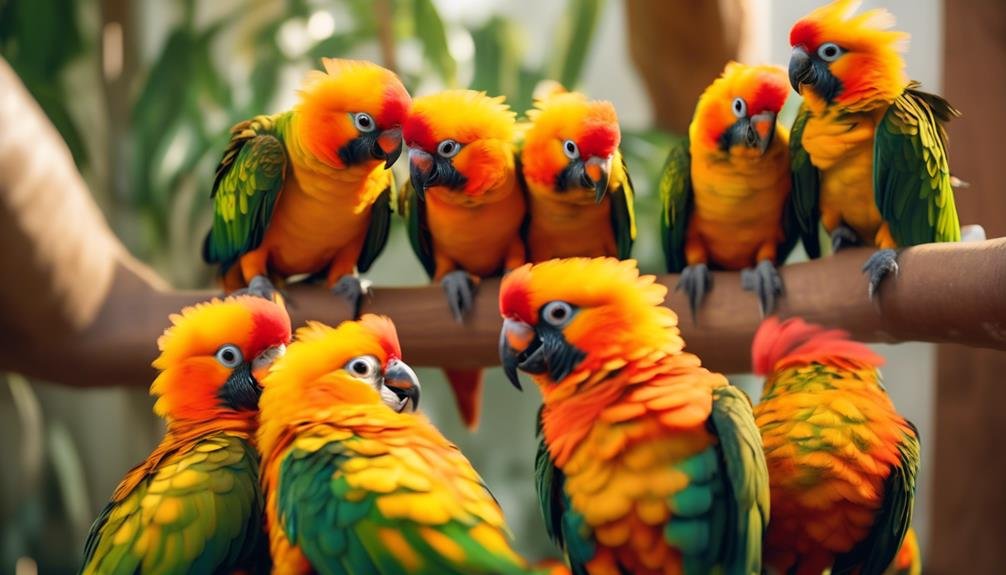
As Sun Conures thrive on social interaction and bonding, understanding their social behavior is essential for their well-being. These playful parrots are highly social birds and form strong bonds with their owners and other birds. They are known to be affectionate and enjoy spending time with their human companions. Sun Conures are also known for their flocking behavior and enjoy the company of other conures. They engage in various social activities such as preening each other, playing, and vocalizing together. Building a strong bond with their owners is crucial for their mental stimulation and overall happiness. Providing ample opportunities for social interaction, such as regular handling, playtime, and training sessions, is vital for their well-being.
| Social Behavior | Bonding |
|---|---|
| Highly social birds | Form strong bonds with owners and other birds |
| Affectionate | Enjoy spending time with human companions |
| Flocking behavior | Enjoy the company of other conures |
| Preening, playing, vocalizing together | Engage in various social activities |
| Strong bond with owners | Crucial for mental stimulation and overall happiness |
| Regular handling, playtime, training sessions | Important for their well-being |
Training and Enrichment
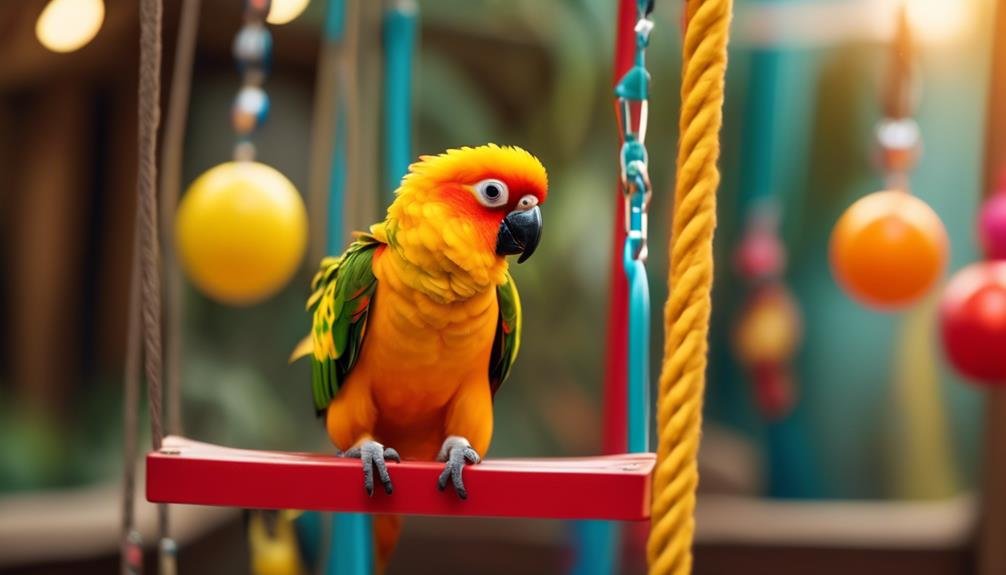
Training and enrichment for Sun Conures is essential to keep them mentally stimulated and engaged. These playful parrots thrive on learning new things and interacting with their environment. To ensure their well-being, here are five important aspects to consider:
- Positive Reinforcement: Sun Conures respond well to positive reinforcement training techniques. Rewarding them with treats or praise when they exhibit desired behaviors helps reinforce these behaviors.
- Interactive Toys: Providing a variety of toys that encourage problem-solving and exploration can keep Sun Conures entertained and mentally stimulated. Puzzle toys, for example, can challenge their intelligence and keep them engaged.
- Clicker Training: Clicker training is a popular method used to teach Sun Conures tricks and commands. The sound of the clicker marks the desired behavior, making it easier for the bird to understand what’s expected of them.
- Environmental Enrichment: Creating a stimulating environment with different perches, swings, and ropes can prevent boredom and encourage physical activity. Rotating toys and introducing new ones periodically can also keep them engaged.
- Social Interaction: Sun Conures are highly social birds and require regular interaction with their owners. Spending time with them, talking, playing, and training together can strengthen the bond and provide the mental stimulation they need.
Health and Care
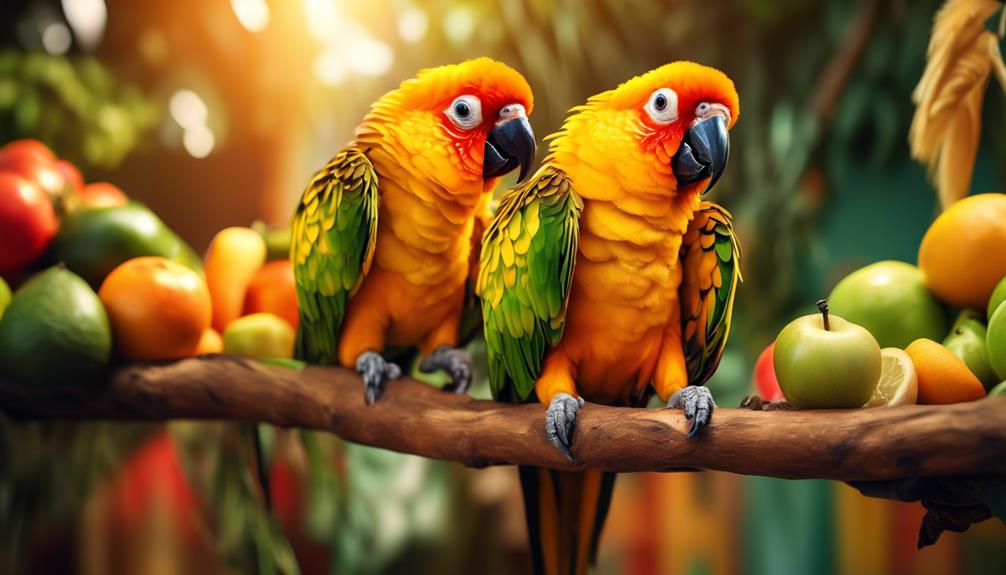
Keeping Sun Conures healthy and well-cared for is crucial in ensuring their overall well-being and happiness. Here are some important aspects to consider when it comes to the health and care of these vibrant parrots:
| Aspect | Care Tips |
|---|---|
| Diet | Provide a balanced diet consisting of high-quality pellets, fresh fruits, vegetables, and occasional treats like nuts or seeds. Avoid feeding them avocados, chocolate, caffeine, alcohol, and foods with high salt or sugar content. |
| Hygiene | Clean their cage regularly, including perches, toys, and food/water bowls. Provide them with fresh water daily and ensure their environment is free from drafts and extremes in temperature. |
| Exercise | Allow them time outside of their cage for supervised play and exercise. Provide toys that encourage physical activity and mental stimulation. |
| Veterinary Care | Schedule regular check-ups with an avian veterinarian to monitor their overall health and catch any potential issues early on. |
| Socialization | Spend time interacting with your Sun Conure daily to maintain their social and emotional well-being. They thrive on human interaction and will enjoy being part of your daily activities. |
Breeding and Reproduction
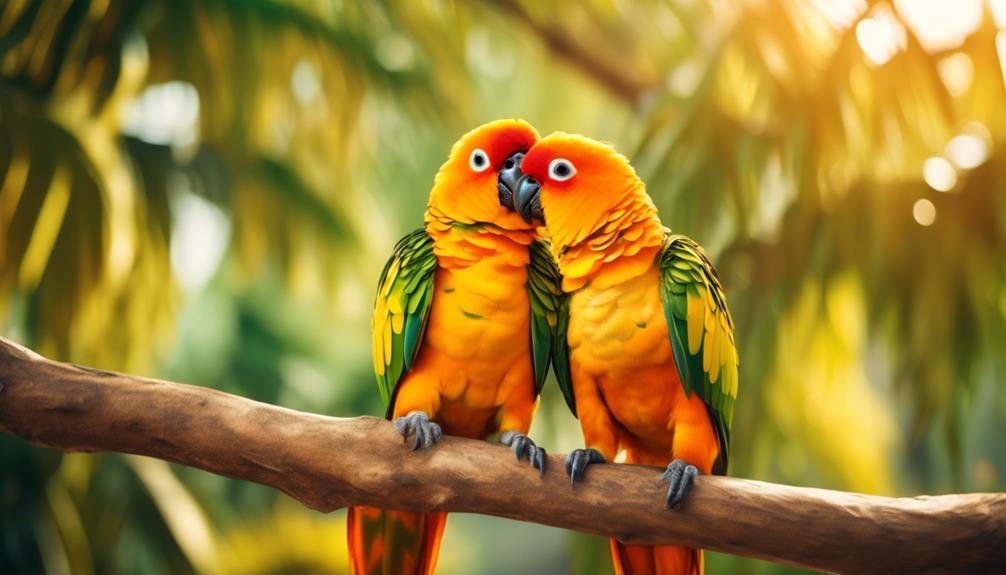
Breeding and reproduction in Sun Conures involves a complex courtship dance and the formation of monogamous pairs. When it comes to breeding, there are several key aspects to consider:
- Courtship Dance: Sun Conures engage in an elaborate courtship display, where they bob their heads, fluff their feathers, and make soft cooing sounds. This dance serves as a way for potential mates to assess each other’s suitability.
- Monogamous Pairs: Once a pair forms, they mate for life and remain faithful to each other. This monogamous behavior is an important aspect of Sun Conure breeding.
- Nesting Behavior: Sun Conures build their nests in tree cavities, using leaves, twigs, and other natural materials. They line the nest with softer materials such as feathers and plant fibers.
- Egg Laying: The female Sun Conure typically lays a clutch of 3 to 5 eggs, which she incubates for about 24 to 28 days. Both parents take turns sitting on the eggs and caring for the nest.
- Parental Care: Once the eggs hatch, the parents feed the chicks regurgitated food and provide them with warmth and protection. The chicks fledge and leave the nest after about 8 to 10 weeks.
Breeding and reproduction in Sun Conures is a fascinating process that showcases their commitment to their partners and their offspring.
Handling and Interaction
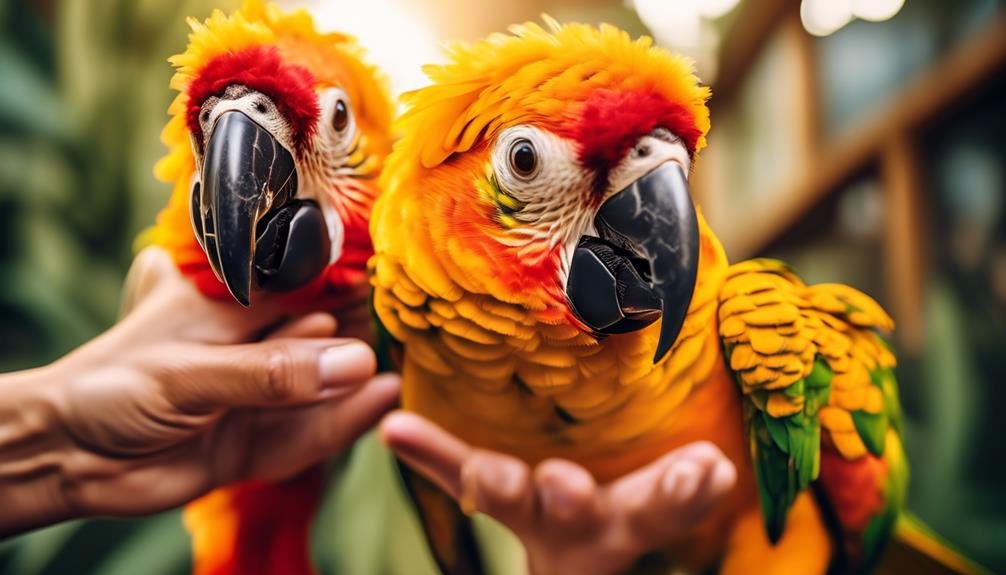
Interacting with Sun Conures is a delightful experience due to their playful and social nature. These vibrant parrots from Brazil thrive on human interaction and enjoy being handled by their owners. Sun Conures are known for their friendly disposition and love to spend time with their human companions.
They’re highly intelligent and can be easily trained to perform tricks or mimic sounds. When handling Sun Conures, it’s important to approach them gently and confidently, as they can be sensitive to sudden movements or loud noises.
Regular interaction and socialization are crucial for their mental stimulation and overall well-being. Spending quality time with these colorful parrots won’t only strengthen the bond between owner and pet but also provide endless entertainment and joy.
Tips for Choosing and Owning a Sun Conure
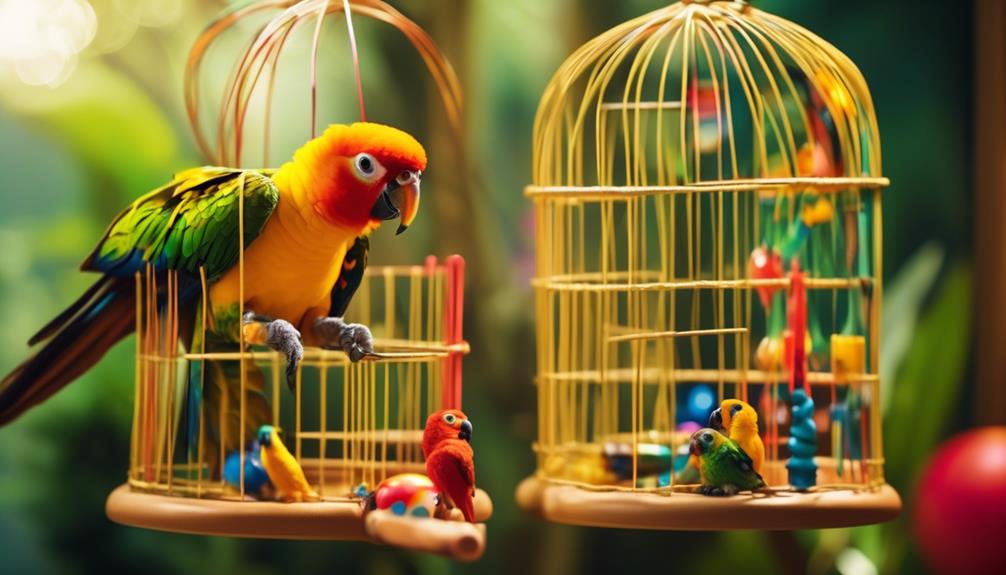
What factors should be considered when choosing to bring a Sun Conure into your home? Here are some important tips to keep in mind:
- Commitment: Sun Conures have a lifespan of up to 30 years, so owning one requires a long-term commitment.
- Space: These medium-sized parrots need a spacious cage with plenty of room to move around and exercise.
- Social Interaction: Sun Conures are highly social birds and thrive on interaction with their human companions. They require daily attention and playtime.
- Noise Level: Sun Conures are known for their vocalizations and can get noisy, especially during their morning and evening calls. Consider your living situation and tolerance for noise.
- Care and Maintenance: Sun Conures need a balanced diet, regular vet check-ups, and proper grooming to ensure their well-being.
Frequently Asked Questions
Are Sun Conures Noisy Birds?
Yes, Sun Conures are noisy birds. They have a high-pitched screech call and can chatter a lot. However, their vocal nature is part of their playful and entertaining personality.
How Long Do Sun Conures Live in Captivity?
Sun Conures have a lifespan of up to 30 years in captivity. They are considered a long-term pet choice due to their relatively long lifespan, which can be attributed to proper care and nutrition.
What Are Some Common Health Issues That Sun Conures May Experience?
Some common health issues that Sun Conures may experience include feather plucking, respiratory infections, and nutritional deficiencies. Regular vet check-ups, a balanced diet, and a clean environment are essential for their well-being.
Can Sun Conures Be Trained to Talk?
Yes, Sun Conures can be trained to talk. They are highly intelligent and can mimic sounds and learn tricks. With proper training and consistent practice, Sun Conures can develop a vocabulary of words and phrases.
Do Sun Conures Need a Specific Type of Diet?
Sun Conures require a specific type of diet to maintain their health and well-being. A balanced diet consisting of fresh fruits, vegetables, pellets, and occasional treats like nuts and seeds is essential for their nutrition.
What Makes American Singer Canaries Similar to Sun Conures in Brazil?
The American singer canary and the sun conure share vibrant colors and lively personalities. Both are popular as pets due to their cheerful disposition and ability to mimic sounds. These avian species are cherished by bird enthusiasts in their respective countries for their striking beauty and charming nature.
Conclusion
In conclusion, Sun Conures are captivating and entertaining pets known for their vibrant colors, playful nature, and ability to mimic sounds. With their stocky build and lifespan of up to 30 years, they make a long-term pet choice for bird enthusiasts.
Providing them with a spacious cage, exercise, and social interaction is crucial for their well-being. Whether it’s their striking plumage or their lively behaviors, Sun Conures are sure to bring joy and amusement to any bird lover’s life.


